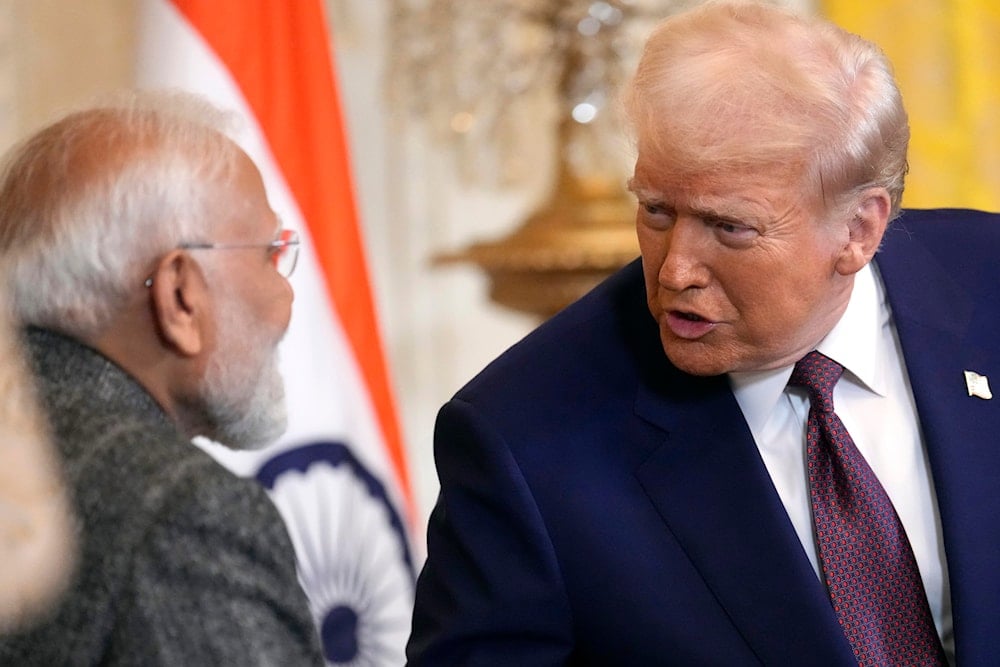India proposes first retaliation measures against Trump’s tariffs
India announces tariffs on US goods worth $1.91 billion in retaliation for Trump’s steel and aluminum duties, escalating trade tensions at the WTO.
-

President Donald Trump speaks with India's Prime Minister Narendra Modi during a news conference in the East Room of the White House, Thursday, February 13, 2025, in Washington (AP)
India has announced that it will impose tariffs on select US goods in response to the steel and aluminum duties enforced by the United States, marking the first direct retaliation by New Delhi against President Donald Trump’s protectionist trade agenda.
Earlier this year, the Trump administration imposed a 25 percent tariff on all steel and aluminum imports into the United States, effective March 12, citing "national security" concerns. The decision triggered alarm among Indian exporters who warned of significant disruptions and financial losses, urging the government to take countermeasures.
New Delhi initially responded with caution, favoring diplomatic engagement while initiating a revision of its customs regime to adjust duties across over 8,500 products, including American exports, such as premium bourbon and Harley-Davidson motorcycles.
Trade tensions escalated further in April when India requested consultations with the United States under World Trade Organization rules, seeking clarity on the legal basis for the tariffs.
Washington rejected the request, maintaining that the tariffs were based on national security considerations and therefore did not qualify as safeguard measures, effectively blocking formal negotiations within the WTO dispute settlement process, prompting India to reassess its strategy.
WTO notification details India’s retaliation
In a notification submitted Monday to the World Trade Organization, India formally communicated its intention to impose tariffs on US-origin goods, estimating that the impact of the Trump steel and aluminum tariffs on its exports reached $7.6 billion.
The proposed countermeasures are expected to generate an equivalent $1.91 billion in additional duties collected from US products entering the Indian market, with India asserting that, under WTO rules, it is entitled to suspend trade concessions when a partner imposes measures that adversely affect its economic interests.
New Delhi described the US tariffs as safeguard measures that fall under WTO jurisdiction and argued that they were imposed without following proper multilateral procedures. As a result, India’s planned India-US trade tariffs aim to restore balance by targeting a comparable value of goods, representing a shift from prior restraint to active economic defense.
India's broader strategic shift
Ajay Srivastava, founder of the Global Trade Research Initiative, commented that India’s WTO filing reflects a broader strategic shift. In remarks to Bloomberg, he noted that New Delhi is increasingly prepared to use legal and institutional mechanisms to counteract trade measures that threaten its industries.
He added that this development underlines India’s evolving approach, where formal Indian retaliation through the WTO becomes a tool to uphold domestic interests and assert its role in shaping global trade norms.
The announcement also came as India pushed back against remarks made by President Trump, who on Monday suggested at the White House that US-India trade talks were linked to the ceasefire agreement between India and Pakistan.
Trump stated, “If you stop it, we’re doing trade. If you don’t stop it, we’re not going to do any trade,” prompting Indian officials to quickly deny the claim, clarifying that no such linkage was discussed in their diplomatic engagements and that the ceasefire understanding was handled independently of any trade discussions.

 3 Min Read
3 Min Read









